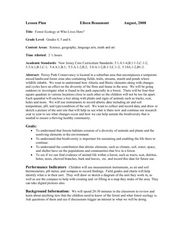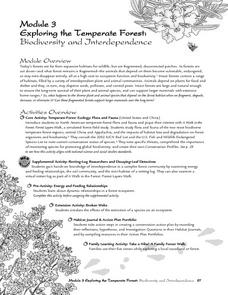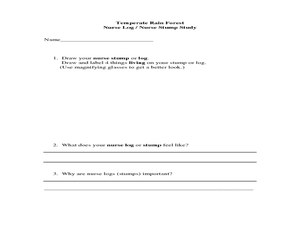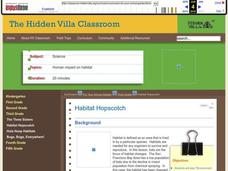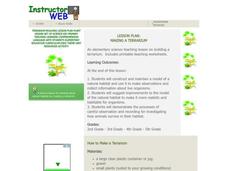Curated OER
Layers of the Forest- Leaf Litter
Students conduct an experiment. In this temperate forest lesson, students discuss what kind of animal life can be found in the forest. They read The Magic School Bus Meets the Rot Squad: A Book About Decomposition and complete an...
Curated OER
Introducing Habitats and Biodiversity
Students identify habitats in Arizona. Theys define and illustrate a food web, and explain the importance fo biodiversity.
Curated OER
Happy Habitats
Students explore different habitats. For this habitat lesson, students investigate four different habitats through participating in a WebQuest. Students create an animal web using Kidspiration or a video documentary upon completing the...
Howard Hughes Medical Institute
Seed Dispersal in Tropical Forests
How do seeds get around? It's not like plants can control seed dispersal—or can they? Dig deeper into the amazing mechanisms of seed dispersal observed in tropical plants through interactives, a video, and plenty of hands-on data...
Curated OER
Habitats
Students examine how different living things interact with their environment. As a class, they discuss the characteristics of a habitat and write the list on the board. In groups, they focus on one habitat and create a mural of the...
Curated OER
Forest Ecology or Who Lives Here?
Students explore a hardwood forest. In this forest ecology lesson, students examine the diversity and animals and plants as they explore their habitats at Poricy Park Conservatory. Students determine how biodiversity and abiotic elements...
Curated OER
Habitats and Components School Forest Lesson Plan
Second graders go on nature scavenger hunts. In this nature scavenger hunt lesson, 2nd graders explore the natural habitat of their school grounds and make observations regarding the objects and animals they find in the air, on the...
Curated OER
Animal Colors and Shapes
Students investigate the natural characteristics of animals by completing a coloring activity. In this animal properties activity, students investigate the reasons different animals have specific colors, and how it is essential for...
Curated OER
"Habitats"
Students complete a unit of lessons on animals and animal conservation. They observe a square meter of ground outside the school, set up a model environment, analyze an owl pellet, grow bread mold, and explore various websites.
Curated OER
Exploring the Temperate Forest: Biodiversity and Interdependence
Middle schoolers examine the consequences of cutting down large amounts of forests throughout the world. In groups, they use the internet to complete a module taking them on a tour through different temperate forests. To end the...
Curated OER
Temperate Forest : Pacific Spirit Field Trip
Students examine nurse logs with hand lenses and identify animals. In this ecosystem lesson, students gain understanding of the rainforest by studying nurse logs. Students become familiar with vocabulary through their study...
Curated OER
Protecting Our Native Forests
Students explore environmental awareness by utilizing computer technology. In this ecosystem conservation lesson, students read assigned text which describes the current ecological conditions of Hawaii. Students collaborate in groups to...
Purdue University
The Great Clearcut Controversy
Urban development and habitat retention are often at odds. A three-part lesson examines the pros and cons of forest clearcutting. Learners review data and characteristics of a specific mammal to make conclusions about the effect...
Curated OER
Habitat, What is That?
Students explore animal habitats. In this environmental stewardship lesson, students match animals to their habitats in a classroom activity. Students also observe a firefly habitat and read Fireflies. Students create bulletin boards...
Curated OER
Habitat for Sale
Students are able to define habitat, and identify the four things that living things need to survive. They are able to describe how living things are adapted to their habitats.
Curated OER
Animal Characteristics
Students investigate the characteristics of animals by creating a chart. For this animal life lesson, students create a KWL chart listing all the different animals a class can name. Students take a field trip to a science facility to get...
Curated OER
A Wild Chain Reaction
Learners explore habitats. In this habitat lesson, students break into groups and are labeled as a part of a habitat. Learners then do an activity with yarn that shows how all of the parts are connected and depend on each...
Curated OER
Habitat
Pupils are able to define habitat. They are able to identify the four things that living things need to survive. Students are able to describe how living things are adapted to their habitats.
Curated OER
Habitat Hopscotch
Third graders explore animal characteristics by participating in a bat environment game. In this natural habitat lesson plan, 3rd graders identify the physical anatomy of a bat and discuss their eating and sleeping habits. Students...
Curated OER
What Do Koalas Need to Survive?
First graders take a field trip and examine the Koala and his habitat. In this Koala lesson, 1st graders read Possum Magic and discuss the foods of Australia. Students view the habitat of a Koala and record what it eats, its...
Curated OER
Our Schoolsyard is Full of Biology
Students study the habitats found in their schoolyard. They apply firsthand, what they have learned in the classroom to something familiar to them. Students look at biotic, abiotic habitats. Small groups will present their findings to...
Aquarium of the Pacific
Ecosystem Comparison
Fifth graders examine plants and animals in two ecosystems and compare them. In this ecosystem survival activity, 5th graders compare and contrast a coral reef and kelp forest ecosystem. Students investigate the abiotic and biotic...
Curated OER
Pond Life
Students recognize the habitats of animals that live near or in a pond. In this pond lesson plan, students examine pond water and look for pond organisms. Students observe organisms with a loupe and complete a worksheet.
Curated OER
Making a Terrarium
Students construct and maintain model of natural habitat, suggest improvements to the model of the natural habitat to make it more realistic and habitable, and demonstrate careful observation and recording of how animals survive in their...





